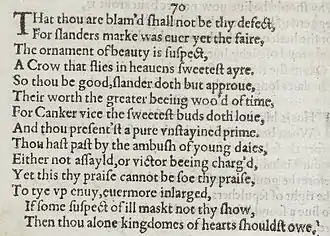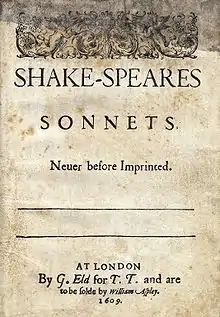Sonnet 70
Sonnet 70 is one of 154 sonnets written by the English playwright and poet William Shakespeare. It is a member of the Fair Youth sequence, in which the poet expresses his love towards a young man.
| Sonnet 70 | |||||||
|---|---|---|---|---|---|---|---|
 Sonnet 70 in the 1609 Quarto | |||||||
| |||||||
Synopsis
Q1 The Speaker assures a young man that accusations against him do not actually harm him, because beauty is always a target ("mark") for slander. Q2 In fact, slander only verifies the worth of the good, as it seeks to be attached to the very best, as (the Speaker claims) the young man is. Q3 The young man has made it this far, either avoiding or triumphing over vice, yet this praise is insufficient to "tie up envy", which always increases. C "[I]f a hint or suspicion of badness did not disguise your true appearance, entire nations would be in thrall to you."[2]
Structure
Sonnet 70 is an English or Shakespearean sonnet. The English sonnet has three quatrains, followed by a final rhyming couplet. It follows the typical rhyme scheme of the form, ABAB CDCD EFEF GG, and is composed in iambic pentameter, a type of poetic metre based on five pairs of metrically weak/strong syllabic positions. The fourth line exemplifies a regular iambic pentameter:
× / × / × / × / × / A crow that flies in heaven's sweetest air. (70.4)
- / = ictus, a metrically strong syllabic position. × = nonictus.
The meter demands a few variant pronunciations: The first and third lines' rhyming words, "defect" and "suspect" are both stressed on the second syllable.[3] Though it is uncertain how contracted words like this might have been in Elizabethan pronunciation, line ten's "either" functions as one syllable, and might have been pronounced as one.[4]
Notes
- Pooler, C[harles] Knox, ed. (1918). The Works of Shakespeare: Sonnets. The Arden Shakespeare [1st series]. London: Methuen & Company. OCLC 4770201.
- Kerrigan 1995, p. 262.
- Kerrigan 1995, p. 262.
- Abbot, E. A. (1870). A Shakespearean Grammar (3rd ed.). London: Macmillan and Company. pp. 347–48 (§466).
Further reading
- First edition and facsimile
- Shakespeare, William (1609). Shake-speares Sonnets: Never Before Imprinted. London: Thomas Thorpe.
- Lee, Sidney, ed. (1905). Shakespeares Sonnets: Being a reproduction in facsimile of the first edition. Oxford: Clarendon Press. OCLC 458829162.
- Variorum editions
- Alden, Raymond Macdonald, ed. (1916). The Sonnets of Shakespeare. Boston: Houghton Mifflin Company. OCLC 234756.
- Rollins, Hyder Edward, ed. (1944). A New Variorum Edition of Shakespeare: The Sonnets [2 Volumes]. Philadelphia: J. B. Lippincott & Co. OCLC 6028485.
- Modern critical editions
- Atkins, Carl D., ed. (2007). Shakespeare's Sonnets: With Three Hundred Years of Commentary. Madison: Fairleigh Dickinson University Press. ISBN 978-0-8386-4163-7. OCLC 86090499.
- Booth, Stephen, ed. (2000) [1st ed. 1977]. Shakespeare's Sonnets (Rev. ed.). New Haven: Yale Nota Bene. ISBN 0-300-01959-9. OCLC 2968040.
- Burrow, Colin, ed. (2002). The Complete Sonnets and Poems. The Oxford Shakespeare. Oxford: Oxford University Press. ISBN 978-0192819338. OCLC 48532938.
- Duncan-Jones, Katherine, ed. (2010) [1st ed. 1997]. Shakespeare's Sonnets. The Arden Shakespeare, Third Series (Rev. ed.). London: Bloomsbury. ISBN 978-1-4080-1797-5. OCLC 755065951.
- Evans, G. Blakemore, ed. (1996). The Sonnets. The New Cambridge Shakespeare. Cambridge: Cambridge University Press. ISBN 978-0521294034. OCLC 32272082.
- Kerrigan, John, ed. (1995) [1st ed. 1986]. The Sonnets ; and, A Lover's Complaint. New Penguin Shakespeare (Rev. ed.). Penguin Books. ISBN 0-14-070732-8. OCLC 15018446.
- Mowat, Barbara A.; Werstine, Paul, eds. (2006). Shakespeare's Sonnets & Poems. Folger Shakespeare Library. New York: Washington Square Press. ISBN 978-0743273282. OCLC 64594469.
- Orgel, Stephen, ed. (2001). The Sonnets. The Pelican Shakespeare (Rev. ed.). New York: Penguin Books. ISBN 978-0140714531. OCLC 46683809.
- Vendler, Helen, ed. (1997). The Art of Shakespeare's Sonnets. Cambridge, MA: The Belknap Press of Harvard University Press. ISBN 0-674-63712-7. OCLC 36806589.
.png.webp)

